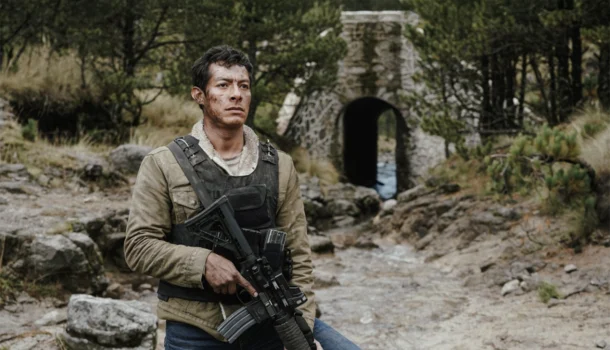There are films that use action as a disguise to conceal the absence of ideas; others, more ambitious, attempt to turn violence into a channel for probing moral contradictions. “Counterattack” seems to aim for this second territory, but stumbles by remaining hostage to a model that favors adrenaline over any substantial elaboration. The staging of the battles is effective, but its insistence on staying at the surface undercuts the impact that could arise from a clash between ideals and reality. Director Chava Cartas flirts with dilemmas that demand narrative boldness but retreats in the face of complexity, opting to preserve tension rather than provoke deeper fractures.
At the heart of the conflict is Captain Armando Guerrero, leader of a Mexican Special Forces detachment tasked with dismantling the operations of a bloodthirsty cartel led by Josefo Urias, known as “El Aguijón.” The brutality of the enemy is made clear from the outset: mutilated bodies discovered by civilians ignite an escalation that transforms a reconnaissance mission into open warfare. Guerrero’s team, nicknamed the Bats for their ability to strike under cover of darkness, is launched into a theater of operations that shifts between suffocating jungles and urban mazes, shaping a battlefield where military logic gives way to calculated improvisation. In each incursion, the line between strategy and survival blurs, while ethics become an unsustainable luxury.
More than a mere backdrop, the setting carries a critical function: the Gulf of California, a vital drug trafficking corridor, is portrayed as a symbol of a war addicted to its own hypocrisy. While state agents risk their lives in the enemy’s crosshairs, the consumption that fuels the machine remains distant, untouched, sheltered in the comfortable ignorance of consumerist centers. The film hints at this dissonance but quickly abandons it in favor of direct confrontation, avoiding the discomfort of questioning the system that sustains the violence. The potential depth of this debate is sacrificed for a more palatable tension that, while effective, diminishes the narrative’s reach.
In its combat sequences, the film reaches its most refined form. There’s a precision in the choreography that avoids gratuitous spectacle, favoring a slow-burn construction of tension. The rescue mission of “El Marrano” showcases this discipline: what begins as a tactically calculated operation descends into tightly controlled chaos, where each move is a decision between failure and survival. However, this cohesion dissipates as the story progresses. Guerrero and his soldiers sometimes behave as if they’re in a simulation where realism can be conveniently suspended, compromising believability for those expecting a more grounded approach to military dynamics.
Among the antagonists, the portrayal is uneven. Josefo Urias embodies the threat but lacks psychological depth; his menace comes from action, not motivation. Meanwhile, Secretary Arvizu — potentially explosive for embodying the link between the state and organized crime — is squandered in a plot that gives him neither time nor space to become truly dangerous. This choice to dilute the one character who could complicate the narrative reveals a self-imposed limit: the film favors clear-cut duels over the messiness of gray zones, as if afraid it won’t be understood if it delves too deep.
The final confrontation between Guerrero and Urias encapsulates this paradox. The scene brims with tension, and the gestures are urgent, but something essential is lost in the mechanics of the clash. The number of enemies conveniently evaporates, realism bends to narrative convenience, and the duel meant to be the symbolic culmination of the conflict dissolves into hollow intensity. It lacks the emotional reverberation to extend beyond the moment, missing a greater meaning to justify the escalation that preceded it. It’s a climax consumed by its own impact, leaving no lasting trace.
“Counterattack” delivers what it promises to those seeking raw, engaging action, but hesitates at the threshold of becoming something more. It gestures toward legitimate concerns — morality under pressure, the ethical collapse of the war on drugs, the limits of loyalty — but chooses not to sustain them when the script demands riskier choices. Rather than commit to ambiguity, it retreats into clarity. And it’s precisely this narrative comfort that prevents the film from crossing the line that separates the competent from the unforgettable.
Film: Counterattack
Director: Chava Cartas
Year: 2025
Genres: Action/War
Rating: 7/10

